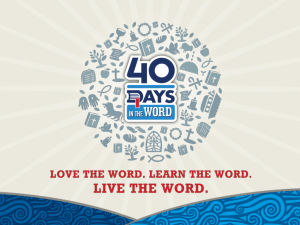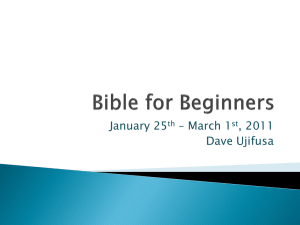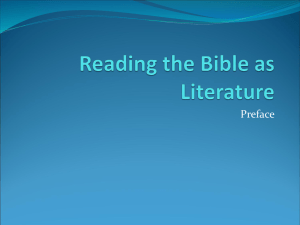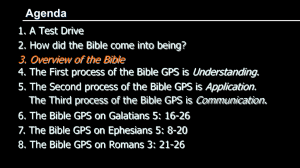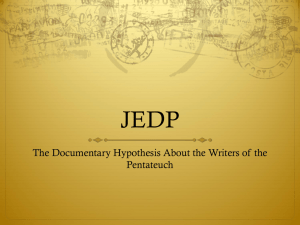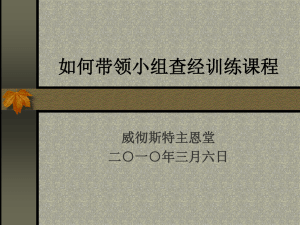How Catholics Understand the Bible
advertisement
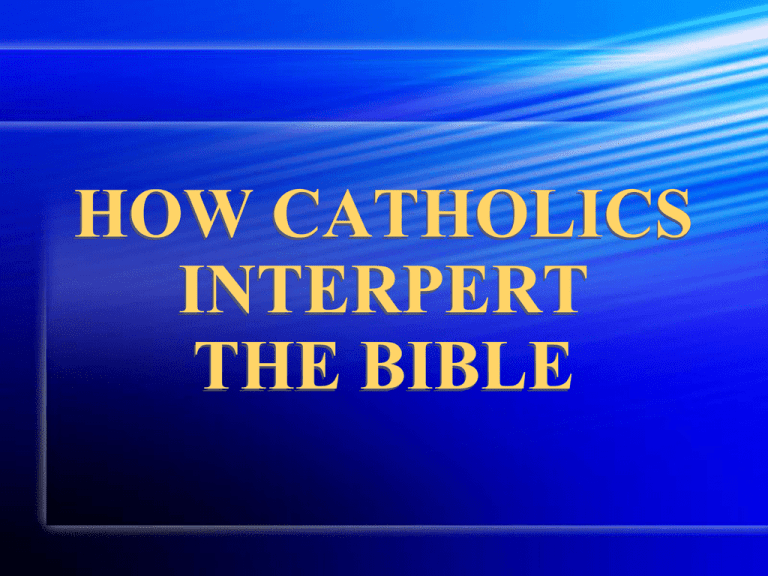
HOW CATHOLICS INTERPERT THE BIBLE Opening Prayer "All Scripture is God-breathed.” As we gather together this evening, let us realize that the words we are studying are inspired by God. May WE be inspired as we seek to understand your mystery, made known to us through revelation. Psalm 119 tells us: "The unfolding of your words gives light; it gives understanding to the simple.” May our simple understandings be broadened and our minds enlightened this evening. Amen. Bible Timeline Adam and Eve The Great Flood Covenant with Abraham Israelites enter Egypt 10 Commandments/Exodus King David / Solomon's Temple Temple destroyed/Babylonian Exile Temple rebuilt ~4000bc ~2350bc ~1900bc ~1700bc ~1500bc ~1000bc ~587bc ~515bc BOOKS OF THE BIBLE - the specifics “Hebrew Bible” or “Jewish Scriptures” - a collection of books written mostly in Hebrew Septuagint A (LXX) - “seventy interpreters” pre-Christian translation from Hebrew to Greek Alexandria Egypt, between 300bc and 100bc FIRST COLLECTION - original collection of books SECOND COLLECTION - added 7 additional “Apocryphal” books (~200-100bc) Entire collection became known as the OLD TESTAMENT BOOKS OF THE BIBLE - the specifics There were lots of books of the Bible: 50+ Gospels, 22 Acts of the Apostles, etc. ROMAN CANON (list) Council of Hippo, 393, created list of Old and New Testament books which is the same as the Roman Catholic Canon today Council of Trent, 1556: Final infallible definition of canonical books. BOOKS OF THE BIBLE - what they contain OLD TESTAMENT: LAW: Torah(5) HISTORY: (12) WISDOM (5) MAJOR PROPHETS (5) MINOR PROPHETS (12) APOCRYPHAL (7) BOOKS OF THE BIBLE - what they contain NEW TESTAMENT: GOSPELS (4) HISTORY/ACTS(1) EPISTLES TO CHURCHES (9) EPISTLES TO FRIENDS (4) GENERAL EPISTLES (9) BOOKS OF THE BIBLE - the specifics “APOCRYPHAL” BOOKS Written ~200-100bc Authors unknown Apocryphal means “Hidden or Secret” Kept carefully concealed and shown only to fullfledged members of the religion. Rejected by Protestants Always considered “inspired” by Catholic Church. BOOKS OF THE BIBLE - the specifics “APOCRYPHAL” BOOKS 1. Tobit 2. Judith 3. Wisdom 4. Ecclesiastes 5. Baruch 6. 1-2 Maccabees 7. Ester (parts) Catholic vs. Non-Catholic Bibles? Many versions of the Bible The Vulgate Revised Standard Version (RSV) New Revised Standard Version (NRSV) New International Version (NIV) New American Bible (NAB)* New Jerusalem Bible (NJB) Revised English Bible Good News Translation Readers Digest Bible BIBLE AS HISTORY Fact or Fiction? BIBLE AS HIS-STORY (and OUR story) INSPIRED??? The bible is the “Inspired” word of God. NOT dictated - but truly God’s word through man God divinely inspired the words used: “Do not think that I have come to abolish the Law or the Prophets; I have not come to abolish them but to fulfill them. I tell you the truth, until heaven and earth disappear, not the smallest letter, not the least stroke of a pen, will by any means disappear from the Law...” The Bible is: “the undeniable, authoritative, Word of God to humanity.” THEOLOGICAL TRUTH - NOT HISTORICAL TRUTH The Bible is not a HISTORICAL document Contains some historical facts Numbers are largely symbolic 7 Days of Creation 40 years in the Desert THEOLOGICAL TRUTH - NOT HISTORICAL TRUTH Must ask ourselves: “What is the Theological Truth? What is God telling us through HIS Story?” Example: Numbers are significant because they indicate something: 7=perfection/completion 40=Conversion/change Old age=favored by God Example: Lk. 10:30 - the Good Samaritan Biblical Punctuation Scriptua Continua Scriptures up until ~900AD were written without punctuation, spacing or capitalization. No, price too high! No price too high! The Bible is “Inerrant ?” Does NOT mean every word in the bible is to be understood literally (I.e. “an Eye for an Eye”) “Unlimited” vs “Limited” Inerrancy Can not Proof-text. Bible must be taken in context Which is it Jesus? John 16:33 - "These things I have spoken to you, so that in Me you may have peace. In the world you have tribulation, but take courage; I have overcome the world.” Matt. 10:34 - "Do not think that I came to bring peace on the earth; I did not come to bring peace, but a sword.” THEOLOGICAL TRUTH - NOT HISTORICAL TRUTH Journeys are sometimes symbolic Mark 7:31-37: Then Jesus left the vicinity of Tyre and went through Sidon, down to the Sea of Galilee and into the region of the Decapolis. Catholic Interpretation of the Bible Multiple sources of God’s revelation Bible Tradition The Church The primary concern must be the literal sense: - the sense the human author directly intended The sense that the words convey Catholic Interpretation of the Bible Historical/Critical Method of Interpretation God speaks through the human context Scriptures were written at specific time/place Local literary forms are important Local customs must be understood Private Interpretation? Church does not promote a “Party Line” about the Scriptures. Catholics are free to interpret the bible. Church is sounding board “Faith Seeking Understanding” What do we know about God from the Bible? What do we know about God from the Bible? How would you interpret this? Gen. 1:26 - Then God said, "Let Us make man in Our image, according to Our likeness; and let them rule over the fish of the sea and over the birds of the sky and over the cattle and over all the earth, Gen. 2:7 - Then the LORD God formed man of dust from the ground, and breathed into his nostrils the breath of life; and man became a living being. Gen. 2:21 - So the LORD God caused a deep sleep to fall upon the man, and he slept; then He took one of his ribs and closed up the flesh at that place. The LORD God fashioned into a woman the rib which He had taken from the man, and brought her to the man. How would you interpret this? Moses Noah lived to be 120 years old lived to be 950 years old How would you interpret this? 2 Kings 2:23-24: From there Elisha went up from there to Bethel; and while he was going up on the way, some small boys came out of the city and jeered at him, saying, "Go up, you baldhead! Go up, you baldhead!" And he turned around, and when he saw them, he cursed them in the name of the LORD. And two shebears came out of the woods and tore forty-two of the boys. From there he went on to Mount Carmel, and thence he returned to Sama'ria. Purpose of the Bible OLD TESTAMENT “The economy of the Old Testament was deliberately so oriented that it should prepare for and declare in prophecy the coming of Christ.” Vatican II - Dei Verbum NEW TESTAMENT GOSPELS: “Principle source for the life and teaching of the incarnate Word, our Savior.” EPISTLES: “firmly establish...more precisely Christ’s authentic teaching.” - Dei Verbum Purpose of the Bible The Books of Scripture are the truths that God put in our hands for the sake of our salvation. God wants to be known…for OUR good!
